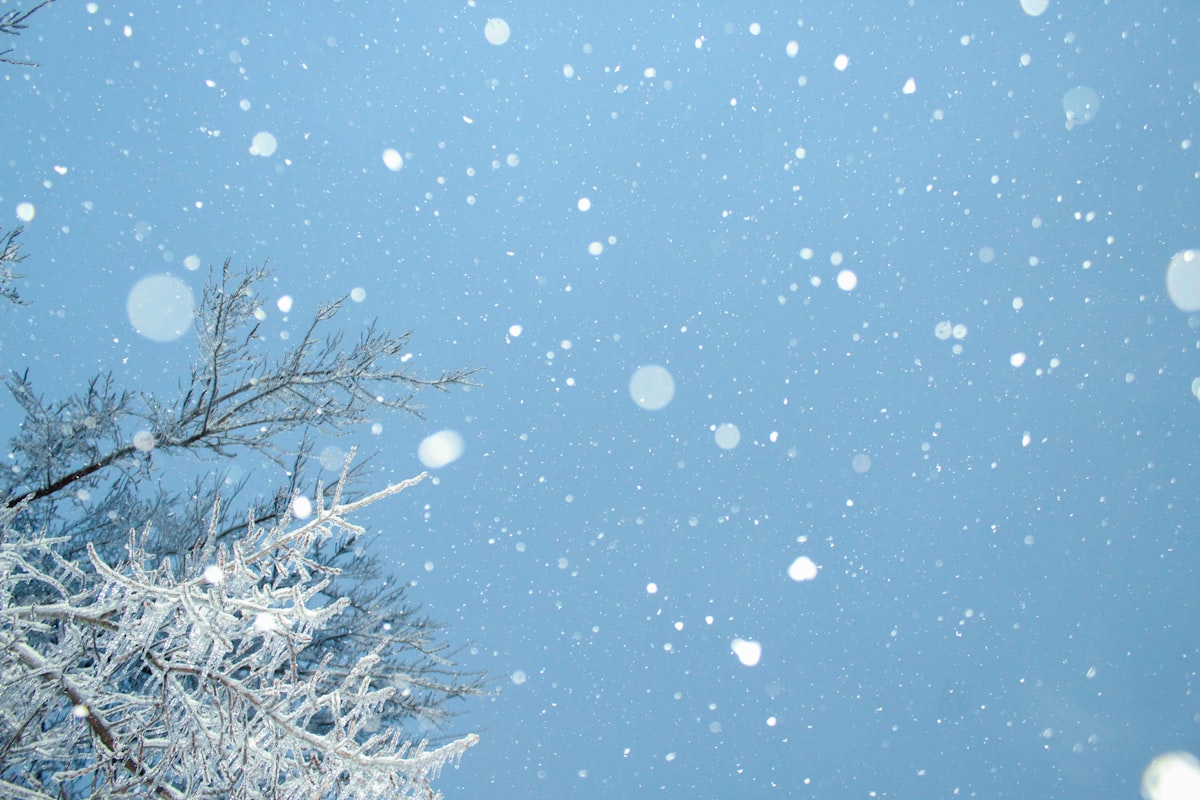La Neige
The phantoms in the streetlight had returned to their posts. The ghost of her father hung in her mind. The 7/11 was open for snacks.

by D.W. White
It was just about that time, now. Emily with great self-control scrolled through but did not continue the conversation with Rachel, messages from another life, another time. It was real, and would still exist in the morning. She backed out and found again her father, who’s name was almost her name, whom she’d seen years before as a hero and hours before as a phantom. She tapped a heart on a message and sent from a saved album a photo with a tree, father and daughter in the warm light of winter. It was late in California and even later in Chicago, but he’d see it when he woke. Emily with her hat and her pride and her memories stood up and made for the pitch black door to hell.
Outside the snow was coming straight down on the exotic hair and red hat of Emily, who was a woman in the dark wintry world. The beasts beneath her feet growled and roared. The wind came down the street and up the street, depending on which way she turned. The lights of the people who lived downtown were mostly out, a few snatches of life lit up behind curtains and shades. The night was young again, beyond the stroke of twelve. The phantoms in the streetlight had returned to their posts. The ghost of her father hung in her mind. The 7/11 was open for snacks.
Emily picked out chips and pretzels and gummy bears, because she was an adult with her own bank account, full of the money she earned at her imaginary job. Outside there was a park beneath a prison which seemed like a nice place to sit. Tombe la neige, her mother would sing, many years ago. Contumacious Emily contemplating egress. Emily looked up at the blacked out windows of the men in jail, biting off the heads of glutinous ursines. She was a human guillotine, a link to her past.
The phone in her pocket which she didn’t take out now had a recent history of messages with an old friend, a former something or other who had returned to the stage. It had all manner of other things, besides. It had numbers reflecting a time that was a very bad time indeed, a time improperly proximate to the time she had to be at work, the time she had to lock herself away in her own building with her own cell. She would go to the office and nod at the people and read the words of past incarnations of herself, words by a woman named Emily, drowning her way through life.
The walk to the red line was short and cold, much like Emily herself. Under the shadow and the light of a building filled with books people slept on the ground in the snow, here in the greatest country on earth. Emily left ten dollars from the job she somehow had in the cup of a woman in the corner. Down the broad boulevard a complex filed with students blinked alive, heated and bright for the kids who stayed at school all winter, idling the time between terms with wine-soaked hallways and movies all afternoon. The lights of the city flashed on and off, telling the ghosts of cars when to come and when to go. Two blocks down the lake wore ice on its edges and sent furious hoards of wind riding sharp against the people living on its shores. Emily took it all in, finishing her pretzels with a frozen hand. In front of her was a staircase leading down into blackness, into the dark realm of the underground beasts, ferrying souls across the municipal underworld. Emily with careful steps on blackiced stairs made her way downward, embarked on her decent to the inhuman land. There were shrieks of light and sound coming up from the darkness, screams of air and blasts of wind whenever the beasts swooped by. In Tartarus the trains ran on time. The station was deserted at so late and early an hour. There were no souls down here, for hell had gone to bed.
Behind her she could see the last life of the city, a signpost on the sidewalk offering the smallest whisper of light. Emily sat on the bench, waiting for salvation. She would have a long day tomorrow, which was today, which was beginning rather badly. She’d survived the Lord’s Day, made it her own. By the time the headlights of the train swung into view, she was really ready for bed. The doors lurched open and she stood up, lines instead of coins on her eyes. Behind her the doors slammed shut and the beast jumped ahead, racing her northward blocks at a time. She’d be home before the dawn.
When she was a little girl Emily believed that the vines in their rows with their fruit and their magic ran on forever, because it was all you could see, clear to the sun. She believed this place she knew was endless, this land all their own. But it wasn’t true. Over the mountains were deserts and highways and concrete and people, coming for whatever she had left.
D. W. White is a graduate of the M.F.A. Creative Writing program at Otis College in Los Angeles and Stony Brook University's BookEnds Fellowship. He serves as Founding Editor for L'Esprit Literary Review and Fiction Editor for West Trade Review. His writing appears in The Florida Review, The Rupture, Another Chicago Magazine, Necessary Fiction, and Chicago Review of Books, among several other publications. A Chicago ex-pat, he now lives in Long Beach, California, where he frequents the beach to hide from writer's block. He can be found on Twitter at @dwhitethewriter.



